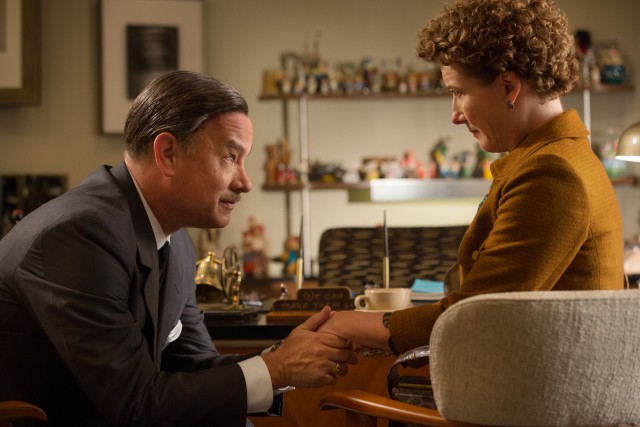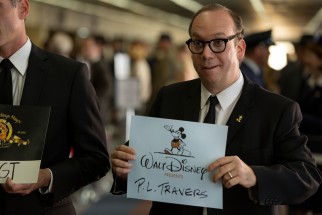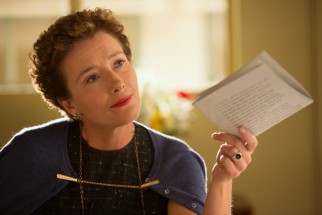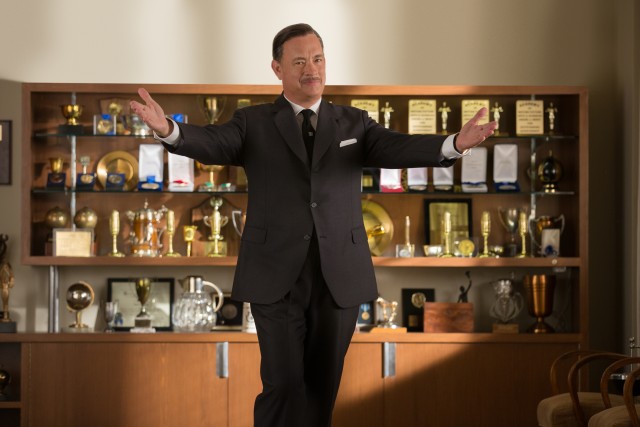Saving Mr. Banks Movie Review
 |
Saving Mr. Banks
Theatrical Release: December 13, 2013 / Running Time: 126 Minutes / Rating: PG-13 Director: John Lee Hancock / Writers: Kelly Marcel, Sue Smith Cast: Emma Thompson (P.L. Travers), Tom Hanks (Walt Disney), Annie Rose Buckley (Ginty), Colin Farrell (Travers Goff), Ruth Wilson (Margaret Goff), Paul Giamatti (Ralph), Bradley Whitford (Don DaGradi), B.J. Novak (Robert Sherman), Jason Schwartzman (Richard Sherman), Lily Bigham (Biddy), Kathy Baker (Tommie), Melanie Paxson (Dolly), Andy McPhee (Mr. Belhatchett), Rachel Griffiths (Aunt Ellie) |
Preorder Saving Mr. Banks from Amazon.com: Blu-ray + Digital Copy • DVD
Walt Disney Pictures has made many different kinds of movies over the past eighty years. Their animated and live-action features have included musicals, fantasies, adventures, science fiction, mystery, and even horror. What Disney has never made is a prestige film timed and designed to win awards. Although Walt Disney the man holds the untouchable record of most Academy Awards won by an individual, even his films most revered today did not compete for major honors in their day. Walt's accolades came from short subject and documentary categories. His animated features were often recognized for their music but little else. Poppins was his only Best Picture Oscar nominee.
The namesake studio he left behind has similarly been marginalized by award shows, settling for song and score wins and some Comedy or Musical Golden Globes back when animated films were still eligible for them. The recent expansion of the Best Picture field, first to ten nominees and then to between five and ten, has allowed Pixar's Up and Toy Story 3 to join Beauty and the Beast as the only animated films to compete for the top prize. Even the company's grown-up divisions, like Touchstone Pictures, rarely vied for that honor, until the field was widened and Touchstone began distributing live-action DreamWorks productions such as the Steven Spielberg dramas War Horse and Lincoln.
But Saving Mr. Banks bucks the trend, as an in-house Disney-branded production that is sure to contend for major Academy Awards and could possibly even grab a Best Picture nomination in a pool as shallow as five. This is news to nobody who stays abrest of upcoming movie releases, least of all Disney, who anticipated this at the project's independent inception and thus scheduled a pre-Christmas opening to maximize impact in both the awards season and year-end best-of lists. Director John Lee Hancock is coming off a Best Picture nomination, albeit one of the more surprising and ridiculed ones of modern times, for The Blind Side. Stars Emma Thompson and Tom Hanks each have two Oscar wins and five nominations to their names. It's no secret that Hollywood loves to celebrate its own history and power, as evidenced by the recent achievements of such films as The Artist, Hugo and Argo.
In light of all this, one enters Saving with some skepticism. Awards bait has a tendency to rub viewers the wrong way. And how can we expect Disney, a company that has canonized its oft-celebrated namesake, to do justice to a story of behind-the-scenes contention and acrimony? Thus, it is with relief and surprise that I can report this film pulls off that difficult feat quite admirably and far more gracefully than you would expect from the director of The Blind Side, The Rookie (2002), and The Alamo (2004).
Today, Disney regards Mary Poppins as the crowning achievement of Walt's career, a film released two years prior to his death that merged the elements of his entire oeuvre in film, television, and theme parks into one joyous crowd-pleasing extravaganza. There's magic, music, family shenanigans, some animation, and a little history, and it all comes together so smoothly and perfectly. A previous attempt with about as much ambition, 1961's Babes in Toyland, had faltered for what today are obvious reasons. It's too sweet, light, and cheap, relying on candy colors, television actors, and a very obvious sound stage. Poppins would improve on that film in every way, deftly balancing merry mirth with familial dysfunction to create something substantial, moving, and absolutely satisfying.
Saving illustrates that the path to those results was anything but direct or easy. P.L. Travers (Emma Thompson), the London-based author of the Mary Poppins books, refused to give Walt (Tom Hanks) the film rights to the stories. For twenty years, Walt inquired and was rebuffed on an annual basis. By the early 1960s, though, Travers ever so slightly warmed to the prospect of a film adaptation, mostly out of financial desperation. Travers is flown to Los Angeles and put up in a hotel that's filled with stuffed dolls of Disney's best-known characters. She is disgusted by that maneuver and by most things American, including her friendly, small talk-making assigned driver (Paul Giamatti).
Disney's trusted talent, screenwriter Don DaGradi (Bradley Whitford) and songwriting siblings Richard and Robert Sherman (Jason Schwartzman and B.J. Novak), have prepared a pitch for Travers, who is immune to their charm and dismissive of their creativity. The author seems immoveably opposed to having her stories become a musical or a cartoon. Even in the presence of the avuncular Walt, Travers is uncomfortable, demanding, and reluctant to dispense with formality. Saving proceeds to document this challenging production, which unfolds with Travers withholding her signature while dispensing some creative license one small step at a time. Even with a PG-13 rating unusual for Disney (and mostly unwarranted for the content), the screenplay from "Terra Nova" creator, Fifty Shades of Grey adapter Kelly Marcel of the UK and Australian television veteran Sue Smith seems to sanitize some of the artistic differences encountered on the Mary Poppins development and shoot. Walt is basically portrayed as a white knight, displaying the patience and restraint of a saint, and the virtue, per 2013 Disney's film smoking policies, to keep his tobacco habit out of sight. Travers, meanwhile, is a mess: protective, paranoid, and stiffly out of turn.
The screenplay gives both Travers and Walt motivation for wanting to endure this uneasy collaboration without conceding too much. Despite his evident business acumen, Walt wants to make good on his promise to his daughters to adapt the books they love. Travers, meanwhile, wants to honor her father (Colin Farell in numerous flashbacks), an alcoholic banker she dearly loved and who loved her in return during her childhood in Australia. The dual narrative that searches for parallels in Travers' upbringing, her fantastical fiction, and her resistance to filmmaker ideas is the weakest aspect of the film. The early 20th century parts inform us some of Travers' unbudging standards, but it's laborious to keep returning to them. They're also derivative of films like Finding Neverland and Shakespeare in Love in presenting some of the experiences that inspired the author. Such a design can be cute or clever in moderation, but here the conceit is stretched thin and robs Travers of any imagination. The flaws of that touch are most evident when young Travers, then called Ginty (Annie Rose Buckley), has a no-nonsense aunt (Rachel Griffiths) with a big carpet bag full of items visit and get the kids to clean up "Spit-spot." Get it? It's just like Mary Poppins!
Most of the time, Saving Mr. Banks is smarter and more sophisticated than that. It does commit an anachronism to fit in a joke involving a stuffed Winnie the Pooh doll. After the sentimental tripe that was The Blind Side, I expected more of Saving to take a feel-good, saccharine route. I'm pleased it does not and, overall, quite pleased with the film. Though she's much younger and more attractive than the real Travers (early 50s in 2013 looks at least twenty-five years younger than early 60s in the 1960s), Thompson unsurprisingly commands the screen. The strong performance, combined with the general lack of lead female roles of substance, virtually guarantees she'll compete in Best Actress category at the Oscars, as she is elsewhere.
Tom Hanks as Walt Disney seems like inspired casting based on the comparable all-American appeal of the Hollywood power players a half-century apart. Unfortunately, Walt is a public figure we're quite familiar with and Hanks doesn't commit to disappearing in the role. Our first glimpse of Hanks as Walt on a (daytime) television broadcast Travers quickly switches off, is the most flawed. Instead of trying, as he should, to embody the showman on-air Walt we know, Hanks is just being his own likable self. The performance improves some as we move on, but it is the role, not the actor supplying weight. While it's fair to say we don't know exactly how the man was behind closed doors, Hanks feels a little folksy and too reverential, even as he hands out pre-signed autographs to Disneyland guests on an improbably undisturbed park visit with Travers.
Supporting cast members mostly fare well in their roles, Giamatti nicely acquiting his Driving Miss Daisy-ish storyline, and the trio of Schwartzman, Novak, and Whitford entertaining as studio pros rightfully flabbergasted by Travers' impropriety.
When I wrote this review back in early December, I made some predictions that, while awaiting embargoes to be lifted, have already mostly come true. I had written "It seems very likely that Saving will do well with critics, not quite The Artist well but much better than Hitchcock." And it has. I went on to say "I'm fairly sure that the film will also pick up some major award nominations, though it probably won't win any." And that also appears to be coming true, unless you want to count the National Board of Review's Best Actress win by Thompson. I apologize on behalf of my Online Film Critics Society, who didn't give the film a single nomination despite screeners having been sent in a timely fashion to our American majority. I know our winners, of which only three earned my vote (by process of elimination), were boring.
I went on to write, "What is less certain is how the movie performs at the box office, lacking the big effects of The Hobbit and Walter Mitty, the anticipated R-rated flair of American Hustle and The Wolf of Wall Street, and the big audience reactions of Anchorman 2." A week in limited release into the film's run, those concerns appear to have risen, at least in comparison to Hustle, which has grossed nearly twice as much in less than half the theaters. Still, I suspect Saving will do just fine commercially, playing well into winter on word of mouth and critical acclaim. Though it definitely will not recreate the blockbuster numbers of Hancock's previous effort, it should have a much greater impact than comparable filmmaking biopics like Hitchcock and My Week with Marilyn.
Preorder Saving Mr. Banks from Amazon.com: Blu-ray + Digital Copy • DVD
|
Related Reviews:
DVDizzy.com | DVD and Blu-ray Reviews | New and Upcoming DVD & Blu-ray Schedule | Upcoming Cover Art | Search This Site
Now in Theaters: Frozen • American Hustle • The Wolf of Wall Street • Nebraska | Oscar Contenders: Gravity • Captain Phillips
Mary Poppins • The Boys: The Sherman Brothers' Story• My Week with Marilyn • Hugo • Argo • Finding Neverland • Australia
Emma Thompson: Beautiful Creatures • Harry Potter and the Prisoner of Azkaban • An Education • Brideshead Revisited
Tom Hanks: Catch Me If You Can • Forrest Gump • A League of Their Own • Extremely Loud & Incredibly Close • Big • That Thing You Do!
Colin Farrell: The Way Back • Epic | Paul Giamatti: Fred Claus • Rock of Ages






